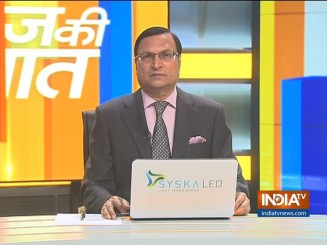 The sixth round of talks between the Centre and farmer leaders scheduled on Wednesday was called off after both sides failed to achieve a breakthrough in the current impasse on Tuesday night. The farmers are on dharna at Delhi border, which has now entered the 14th day.
The sixth round of talks between the Centre and farmer leaders scheduled on Wednesday was called off after both sides failed to achieve a breakthrough in the current impasse on Tuesday night. The farmers are on dharna at Delhi border, which has now entered the 14th day.
In a late evening four-hour-long meeting between Home Minister Amit Shah, three other central ministers and some selected farmer leaders in the National Agricultural Science Complex in Pusa, New Delhi, the farmer leaders insisted on repeal of the three new farm laws. This was rejected by the Centre, which said it would send fresh proposals for amending the laws.
The talks took place on a day when the Bharat Bandh call given by the farmer leaders, and supported by 22 political parties, evoked partial response in states like Punjab, Haryana, Jharkhand, Bihar, Bengal, MP, western UP, Karnataka, Rajasthan, while it had impact in states like Kerala, Andhra Pradesh, Telangana, Chhattisgarh and Odisha. Overall, the bandh had visibly no impact on normal life in metros like Delhi, Mumbai, Chennai, Kolkata and Bengaluru.
Congress, Telangana Rashtra Samiti, Trinamool Congress, Samajwadi Party and Left parties’ activists tried to block road and rail traffic for some time, but business establishments and offices remained open in most of the states. In my prime time show ‘Aaj Ki Baat’ on Tuesday night, we showed visuals of markets open in Delhi, Mumbai, Lucknow, Bengaluru and several other cities.
In Bhilwara and Jaipur of Rajasthan, traders opposed Congress workers who were trying to shut down markets. Many of the traders chanted ‘Modi, Modi’ slogans. In Vyawara town of Rajgarh, Madhya Pradesh, traders openly told the local Congress MLA to leave and allow them to keep the markets open. In Lucknow and Prayagraj cities of Uttar Pradesh, Samajwadi Party workers, instead of trying to shut markets, went to railway stations, sat on engines, did brief photo-op sessions and then left. Instead of obstructing rail traffic, they were more interested in sending videos of their protests to their leaders.
These visuals clearly indicate that the common public, including office goers, businessmen and shopkeepers, were not interested in ‘Bharat Bandh’ because they have realized that the opposition parties were least interested in protecting the rights of farmers, and were merely indulging in political sabre rattling. Even most of the opposition leaders have realized that the common people is not at all unhappy with Prime Minister Narendra Modi, whose ministers are busy trying to find a solution to the farmers’ grievances.
Why was the ‘Bharat Bandh’ call proved to be a flop? There are several reasons: One, the bandh call was given by farmers’ organisations, but major political parties waded in and lent their support, politicizing the entire issue. Though people were sympathetic towards the farmers, they realized that the opposition parties were trying to gain political mileage by resorting to ‘rasta roko’ and ‘rail roko’.
Two, common people of India continue to have trust in Modi’s leadership and they know that his government is sincerely trying to resolve the issues raised by the farmers. Three, for the last eight months due to Covid restrictions, shopkeepers, traders and middle class people working in markets and shopping malls, had been facing too many financial hurdles, and they were unwilling to shut down the shutters again.
The people at large do sympathize with the farmers who have been out in the cold on Delhi’s borders for the last 13 days, but they are wary of opposition parties trying to politicize the issue. Moreover, farmers are presently busy with the sowing season for Rabi crops in states like Punjab, UP, Madhya Pradesh, Haryana and other states, and they do not have time to leave their work and go to sit on dharna in Delhi.
I have learnt from my sources that many of the farmer leaders who have come to Delhi do not doubt the sincere intentions of the Centre, but the problem with them is that they are not united. They do not have a single leader or a collective leadership. There are many groups, several leaders, and some of them are trying to dominate the others by appearing to have the most extreme views.
In order to project themselves as ‘strong’ leaders, they are hardening their stand to gain popularity. The farmer leaders and their supporters, out of sheer bravado, have stuck to the ‘Yes or No’ line, meaning, either repeal the new laws, otherwise they will be no discussions. They understand that this cannot be accepted. There has to be a way out of the impasse.
The farmer leaders are looking for a face saving device so that they can tell their supporters that they have won the battle. Some farmer leaders wanted that Prime Minister Modi should meet them, but ultimately they agreed to meet Amit Shah. Now that the ball is in the farmers’ court with the Centre sending its formal proposals, their leaders will have to decide.